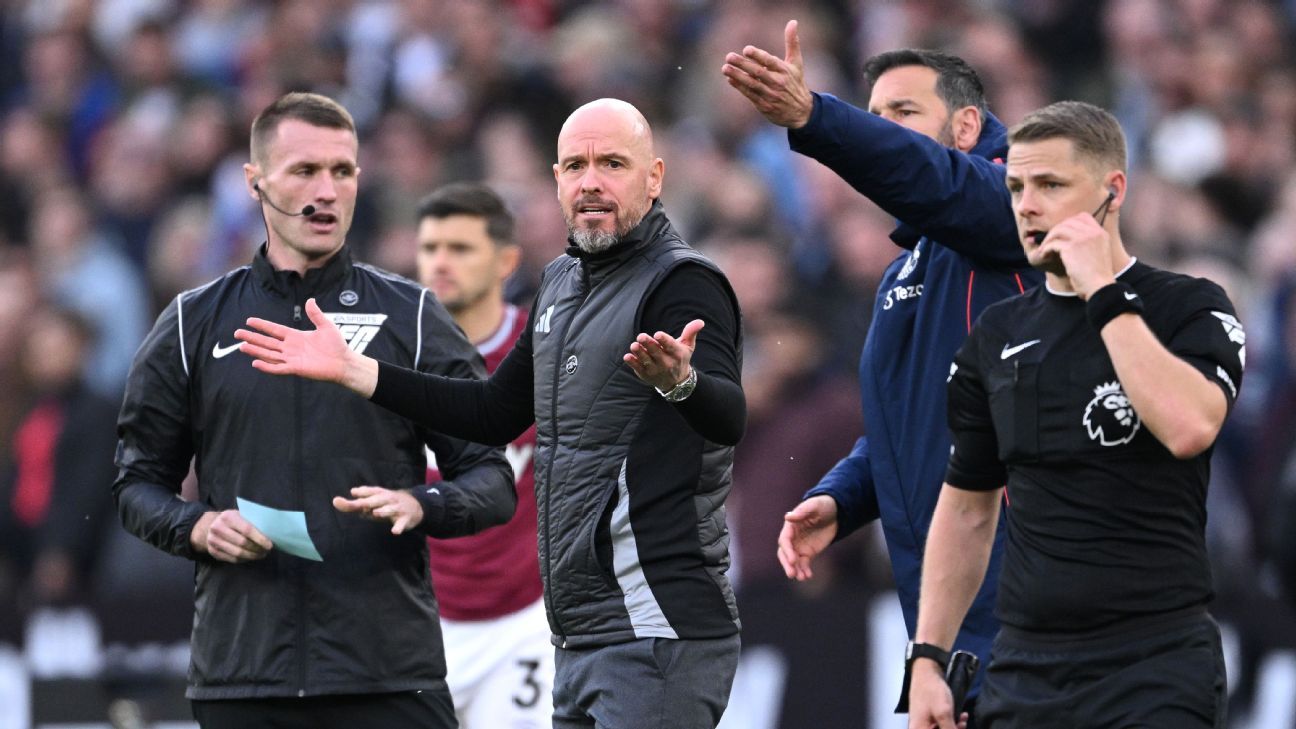Howard Webb, the chief refereeing officer of the Premier League, admitted that West Ham United were wrongly awarded a penalty through VAR which gave them a 2-1 win at home to Manchester United that resulted in the firing of manager Erik ten Hag.
The Premier League game on Oct. 27 was locked at 1-1 in the 89th minute when Matthijs de Ligt clashed with Danny Ings inside the penalty area. Referee David Coote played on, but was sent to the pitchside monitor by the VAR, Michael Oliver, to award a spot kick. Jarrod Bowen dispatched the penalty to give the Hammers victory.
Editor’s Picks
2 Related
Ten Hag, who had been under immense pressure with United suffering their worst-ever start to a Premier League season, was fired the following morning. Sporting CP boss Ruben Amorim was appointed as his replacement and started in the role this week.
Speaking on the Match Officials Mic’d Up show, Webb admitted that the incident did not reach the high bar for a VAR intervention.
“I thought it was a misread by the VAR, a VAR that’s normally really talented and reliable, but gets uber-focused in this situation on De Ligt’s leg,” Webb said. “His [De Ligt’s] leg coming through on to Danny Ings, not making any contact with the ball. The ball’s already past De Ligt as he as he makes contact with Danny Ings.
“And the VAR sees that as a clear foul. I think he was too focused on that aspect. I don’t think he should have got involved. I think this is a situation where we’d leave the on-field decision as it is, probably whichever way it’s called. On balance, I don’t think it’s a penalty kick. I would prefer no foul being given, no penalty.”
Webb also backed the decision for the VAR to advise a red card to Arsenal‘s William Saliba against AFC Bournemouth for denying an obvious goal-scoring opportunity (DOGSO).
Former Man United manager Erik ten Hag argues a penalty call in his final game as coach against West Ham. Getty Images
“I think that the offence committed by William Saliba in this situation did deny Evanilson an obvious goal-scoring opportunity,” Webb explained. “I think the yellow card that was issued by Rob Jones on the field was clearly and obviously wrong.
“It’s a poor pass back by Leandro Trossard that puts Evanilson in and then Saliba grabs him. So suddenly from Arsenal having possession, the referees are faced with having to make a decision very quickly. Sometimes with DOGSO you have time to prepare your mind for what’s going happen.
“Initially they believe that Ben White was closer than he actually was. And they also weren’t convinced that Evanilson would control the ball.
“There’s two things that VAR can do here to prove that the on-field decision was wrong. Firstly, you can see that Ben White is a long way away. He’s not going to get to Evanlison from that position. And then secondly, they can see that David Raya is backing off and when the ball dies in front of Evanilson, even though it’s some distance from goal, he’s going to get on to that ball. He’s going to have time to gain nice control just for the goalkeeper to beat.
“So, for me, a good intervention by the VAR, a clear and obvious error in not showing a red card on the field.”
So far this season the Premier League’s Key Match Incidents Panel, which assesses all matches, had identified only three VAR errors — the other two being AFC Bournemouth’s late “winner” at home to Newcastle United which was incorrectly disallowed for handball, and the missed intervention when Bruno Fernandes‘ red card should have been rescinded in Man United’s home game against Tottenham Hotspur. At the same stage last season, 13 mistakes had been recorded.
This campaign has also seen five on-field errors which didn’t reach the threshold for VAR intervention, two incorrect second yellow cards, and one missed second caution.







